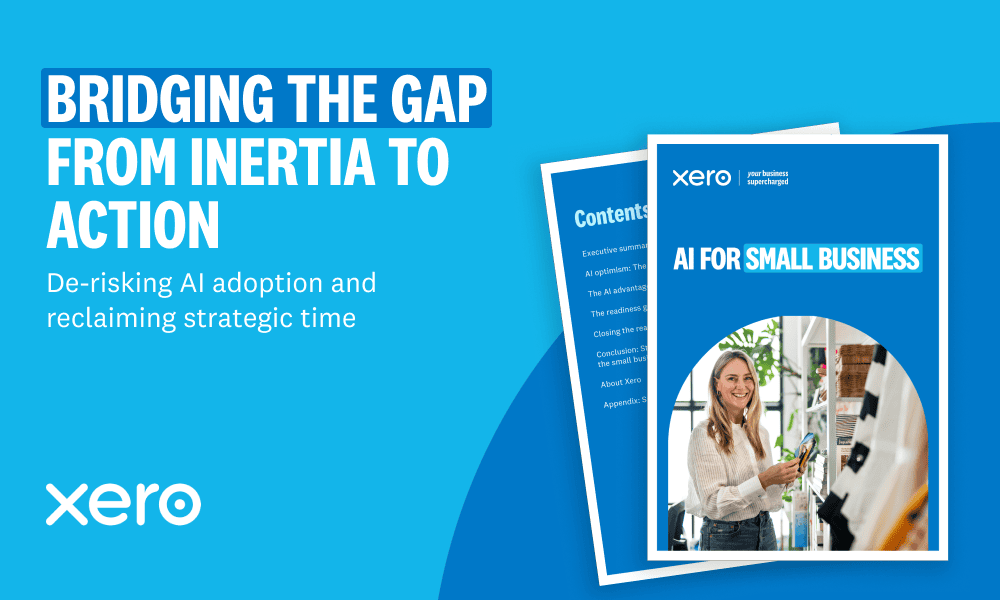
From optimism to revenue: How to close your AI readiness gap
Last updated: Nov 8, 2025

For small business owners, the discussion around AI often focuses on high-cost, complex change. When you’re busy running the business, we know adopting new technology can feel like a high-risk gamble against an uncertain return.
Here’s the reality: AI is already delivering a measurable impact where it counts most. Revenue growth.
We recently surveyed small business owners across Australia, the UK, and US on their AI usage and the findings confirmed that it can be a tool for competitive advantage today; Businesses that use AI consistently are significantly more likely to grow their revenue.
This finding should be the starting point for every business owner measuring the cost of adoption of a new technology. But our research also identified a deep divide; While most owners feel optimistic about AI’s potential (around 55% are confident in using it), a readiness gap exists. In fact, 53% of small businesses across three major markets report that if AI disappeared today, it would have no impact on their operations.
This disconnect is creating an opportunity cost – the measurable loss of potential growth, efficiency, and revenue that early adopters are already securing.
Why AI adoption is no longer optional for growth
AI is not a tool for complex, future-state transformation; it’s a direct tool for competitive advantage today. Our research validates that active engagement is the true engine of financial success.
The numbers linking consistent AI use to financial success are stark:
- The daily edge: Owners who use AI daily were twice as likely to see a revenue increase compared to those who never use it (28% vs. 12%).
- The adoption advantage: Among businesses that saw revenue growth, 55% reported using AI at least weekly. This rate is significantly higher than the 44% average for all businesses surveyed.
- The mindset factor: Owners who described themselves as “excited and optimistic” about AI reported the highest increase in revenue over the past year (23% saw an increase).
The core value of AI is not replacing your work; it’s reclaiming your time for the essential human skills – like leadership and creativity – that truly grow your business.
As Seonaid Royall, founder and CEO of Sprout Up, shared, “Conscious adoption is where the strategic value lies, turning overwhelming strategic challenges into manageable, uplifting tasks.”
How to get started: The three-pillar approach
Closing this gap means a move from passive optimism to mindful, strategic AI implementation. You can start small, focusing on incremental steps that build confidence and compound over time.
1. The mindset shift: Embrace the hypothesis
Traditional software operated on guaranteed rules, leading to deterministic thinking. Generative AI is different; its outputs are probabilistic – it’s seeking the most likely answer, not the absolute one.
Since running a business is also inherently probabilistic (success is never guaranteed), you must cultivate an experimental mindset. Treat the application of technology as a hypothesis to be tested and refined.
Challenge your assumptions: If you are part of the 19% of small businesses who think their current software is “good enough”, ask yourself: Has AI broken the old assumptions that kept you from changing before?
Tip: Adopt the mindset of a scientist: Test, measure, and be open to the data’s findings.
2. Taking action: Audit your time drains
The biggest conflict for small business owners is that running the business (operations) directly competes with growing the business (strategy). The core value of AI is its ability to reduce the mental effort for routine, low-value tasks.
For example, Destynee Turner, owner of The Optical Experience, saved eight hours a week by automating her social media content calendar, allowing her to focus more on brand strategy.
Xero focuses on automating actions and workflows so they’re just done, but with you still in control. We use AI to complete manual tasks like data entry and bank reconciliation in seconds, while ensuring these core accounting jobs are handled with appropriate oversight.
Tip: Start internally by mapping your core processes to identify the top three tasks that are the largest drain on your strategic time. Focus your investment on tools where the ROI is measured in minutes of high-value strategic time earned, not just cost savings.
3. Securing the environment: De-risk adoption by building trust
In our research, small businesses reported being concerned about data privacy and security (cited by 38%) and the accuracy and reliability of AI output (cited by 32%).
To de-risk adoption, shift the burden of trust away from the AI tool and onto the technology vendor. Place your trust in the organisation’s utilising the capabilities responsibly.
Alan Tse, owner and co-founder of Altina Drinks, understands the importance of a reliable vendor and says he trusts “established enterprise systems such as Xero” with sensitive financial data.
At Xero our AI is built on a foundation of trust; it’s built with the same robust security you already expect from our products. We ensure your data is not only safe but also private, and we adhere to our responsible data use commitment while delivering reliable, actionable insights.
Tip: Conduct due diligence on a vendor’s track record for security and their responsible data use commitments. Consult your accountant or bookkeeper to help vet and implement new tools in the context of your specific business and industry.
Ready to start your 30-day plan?
The future of business is about reimagining financial management, with AI helping small businesses and their advisors work smarter, together. But, the decision to move from hesitation to action starts with a shift in mindset. You can take small, deliberate steps that deliver incremental improvement and build confidence over time.
Read the full white paper for more on this research and to access the complete First 30 Days of AI Implementation action plan – Bridging the Readiness Gap: How to de-risk AI adoption and reclaim strategic time. Learn more about how Xero is using AI to automate workflows and drive actionable insights in your business. Existing Xero subscribers can try JAX today; new customers can sign up to Xero here.





